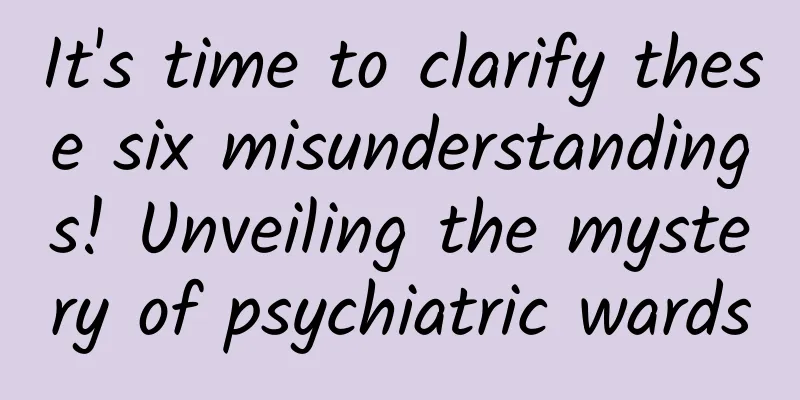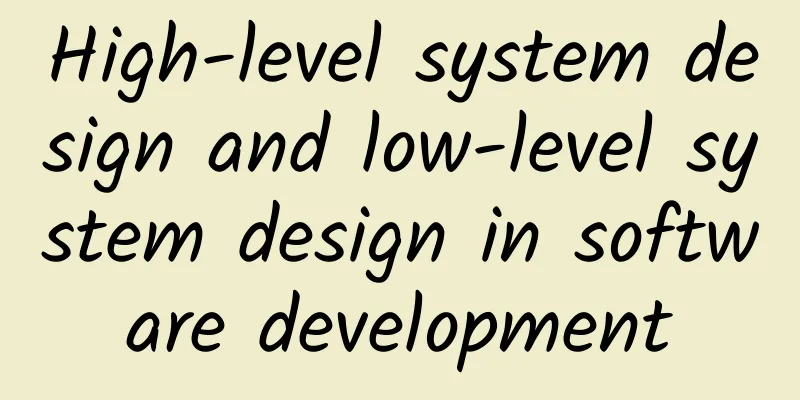It's time to clarify these six misunderstandings! Unveiling the mystery of psychiatric wards

|
According to the World Mental Health Report released by the World Health Organization (WHO) in 2022, nearly 1 billion people in the world suffer from mental illness. By the end of 2021, there were 6.6 million patients with severe mental disorders registered in my country's database. In this area shrouded in misunderstanding and prejudice, psychiatric wards, as professional places for treating patients with mental illness, often become a place full of questions and curiosity in the minds of the public. Today, as an "old driver" who has worked hard in the closed psychiatric ward for 15 years, I will lead everyone on this journey of exploration, unveil the mystery of the psychiatric ward, and take you to appreciate this space full of hope and care. Q1: Are all patients with mental illness locked up when hospitalized? A1: This is a big misunderstanding! Psychiatric wards are actually divided into two types: open and closed. Outpatient doctors will tailor the most suitable hospitalization plan for the patient based on their specific situation. Only those patients who have impulsive hurting, suicidal and self-harming behaviors, lack of self-awareness or refuse to cooperate with treatment will be arranged for closed hospitalization. Q2: During closed inpatient treatment, will the patient be beaten or tied up if he/she is disobedient? A2: Absolutely not! In the psychiatric ward, we follow the principles of humanity and professionalism. Only when the patient shows impulsive hurting, serious suicidal or self-harming behavior or tendency, after strict evaluation by doctors and nurses and with the consent of the family, will protective restraint be carried out. During the restraint period, we will ensure that the patient's physiological needs are met and provide psychological counseling. Once the patient's emotions are stable, the restraint will be released immediately. Q3: Is the closed ward like a prison, with iron doors and windows? A3: Of course not! The design of the psychiatric ward takes full account of the comfort and safety of the patients. The ward is equipped with furniture without sharp corners, spacious and bright, avoiding the discomfort caused by long-term closure. In addition, the ward is also equipped with an activity room, a reading corner, a soft-padded emotional venting room, etc. Every detail reflects the meticulous care for the patients. Q4: Are all the patients in the psychiatric wards suffering from behavioral disorders such as hitting others, swearing, stripping off clothes and pants, and talking nonsense? A4: This is a common misunderstanding. In fact, there are many types of mental illness, including depression, anxiety, schizophrenia, bipolar disorder, etc. In fact, only a few patients will show symptoms of behavioral disorders, and most patients behave relatively normally. They may just show symptoms such as auditory hallucinations, delusions, emotional indifference, and laziness in life. Q5: Is the hospitalization life of patients with mental illness boring? A5: Quite the opposite! In the psychiatric ward, we tailor a colorful hospital life for patients. The closed ward has a detailed schedule of work and rest. Medical staff will lead patients to carry out a series of activities according to the type of disease, such as health exercises, music therapy, painting therapy, occupational therapy, group games, health education lectures, movie appreciation, chess and card games, karaoke, etc., so that patients can get comprehensive physical and mental healing during hospitalization. The open ward is similar to the general physical disease department. Patients can enter and exit freely and choose the treatment method. Q6: Does hospitalization mean taking medicine? A6: Of course not! In the psychiatric ward, drug therapy, psychotherapy and electroconvulsive therapy are known as the "three magic weapons". Electroconvulsive therapy is a new type of physical therapy that can quickly control mental symptoms. It is suitable for patients with refractory mental illness, severe suicidal and self-harming behaviors and tendencies, extreme excitement and impulse, hurting and destroying behaviors, and intolerance to antipsychotic drug treatment. Psychotherapy can improve mental symptoms, improve patients' medication compliance, improve patients' social skills, enhance self-awareness, and effectively reduce disease recurrence. Psychiatric wards are not only places where patients with mental illness receive treatment and rehabilitation, but also a space full of understanding, care and hope. Correctly understanding mental illness and its treatment is not only related to the health of patients, but also to the harmony and stability of society. Let us work together to contribute to the cause of mental health! Hunan Medical Chat Special Author: Luo Yun, a male adult psychiatrist at the Hunan Second People's Hospital (Provincial Brain Hospital) Follow @湖南医聊 to get more health science information! (Edited by YT) The cover image of this article comes from the copyright library. Reprinting and using it may cause copyright disputes |
<<: Is chapped lips caused by dryness?
>>: It’s cold, and you have to go to the bathroom before bed…is this you?
Recommend
What should I do if my short videos don’t increase my followers? How to attract fans through short videos?
Many short video creators have been complaining t...
Jobs didn't even write a PowerPoint presentation about the Apple car, but Cook tried to drive it on the highway
Jobs' father was a competent auto mechanic. A...
We have always called it a battery, but which “cell” in battery is it?
We have always called it a battery, but what does...
To increase the volume of Tik Tok video advertising, these 4 points cannot be ignored!
In TikTok, you often see those popular video ads ...
Practical Douyin promotion skills, teach you how to play Douyin from scratch!
In the past two years, the traffic dividend has b...
Four new and useful features! Detailed experience of the new WeChat version
A few days ago, WeChat launched the Android beta ...
How to promote a newly launched App? A complete guide to starting an app promotion
In recent years, mobile Internet has been at the ...
7 Ways to Use Tik Tok for Marketing Purposes
Recently, I saw a few complaints about Douyin in ...
Tik Tok operation and promotion plan, super detailed!
Recently, Douyin released the "2020 Spring F...
10,000-word article analyzing mobile map competitors: Amap, Baidu, Tencent
This article takes the products of the three gian...
How to improve APP’s next-day retention?
What is next-day retention? Next-day retention, o...
The fastest way to earn $500,000 a month? Apple App Store becomes a hotbed for scam software
Recently, foreign technology writer Johnny Lin pu...
He Pengde, former BD director of Sohu and Baidu, talks about app promotion: How to help the App promotion team save 30 million promotion budget every year!
He Pengde Former wireless BD director of Sohu and...
Who will win the smart fitness market, Google or Apple?
The Apple Watch is coming on strong. The battlefi...
Android 12 is officially released: the biggest design change in Android history, smoother!
The much-anticipated Android 12 is finally here. ...









